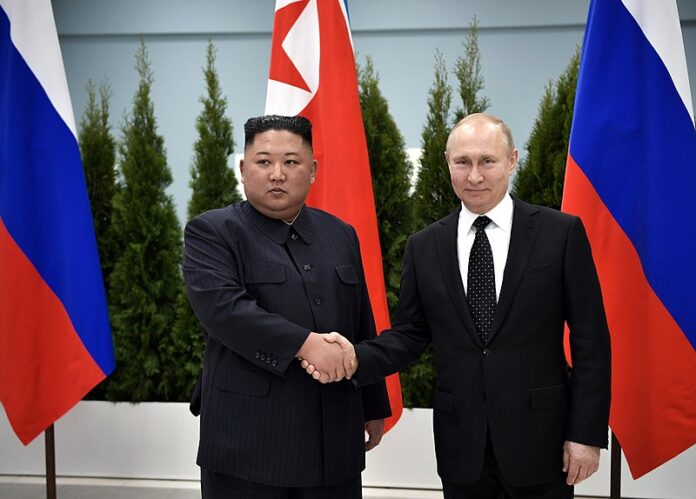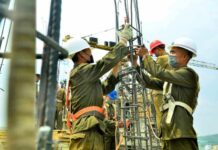
Seven months after sending a birthday greeting to Russian President Vladimir Putin, North Korean leader Kim Jong Un has sent another message to Moscow – this time to congratulate him on the 78th anniversary of the Soviet Union’s vanquishing of Nazi Germany in World War II. The anniversary, celebrated annually on May 9, is Russia’s most important secular holiday.
Voice of Korea, the DPRK’s international broadcasting service, released the full message in which North Korean dictator Kim Jong Un extended “warm and militant greetings” to Russian President Vladimir Putin, congratulating his nation on the “brilliant victory in the great Patriotic War” in 1945.
“Victory is a tradition proper to Russia,” Kim wrote, indicating his conviction that the Russian soldiers will emerge victorious from the Ukraine-war, which he called a “sacred struggle to realize international justice.”
He told Putin: “I believe that the tenacious and just Russian people will, under your leadership, continue to achieve victory in the future, too, in their efforts to ensure sovereignty and dignity of the country and stability of the region, destroying all sorts of challenges and threat of the hostile forces.”
Strong ties between two of the most isolated nations in the world
As Russia’s global isolation grows over its war in Ukraine, it appears to be placing more emphasis on good relations with North Korea – which, in turn, has continuously reciprocated through public support for Russia’s “special military operation” in Ukraine since the conflict began on Feb. 14, 2022.
The DPRK was among the five UN member states that voted against the United Nations (UN) General Assembly resolution calling on Russia to withdraw its military forces from Ukraine. The others were Russia itself, Belarus, Eritrea and Syria.
It was also one of the only countries in the world to recognize the independence of the Donetsk and Luhansk People’s Republics, two proxy statelets in eastern Ukraine, and to support Putin’s proclaimed annexation of other regions. After all, the war was only the result of the “hegemonic ambition” of the United States, NATO and Ukraine, the DPRK Ministry of Foreign Affairs claimed in 2022.
Artyom Lukin, a professor at Far Eastern Federal University in Vladivostok, wrote in a report for 38 North that the two countries “may become increasingly close, perhaps even to the point of resurrecting the quasi-alliance relationship that had existed during the Cold War.” Indeed, Pyongyang had recently begun to describe its relations with Russia as “tactical and strategic cooperation,” Lukin said.
Illegal trade and labor exchange
The two isolated countries are believed to be supplying each other with raw materials in defiance of UN sanctions. Moscow has denied ever violating the UN’s embargoes on North Korea, in particular accusations that it had exported illegal amounts of oil to the DPRK even before the war began.
In addition, North Korea sends low-wage workers and soldiers to Russia for three years of service to earn foreign currency – an arrangement that has been in place for more than three decades. Daily NK found that despite the ongoing Ukraine war and UN resolutions, new workers are still coming to Russia. As recently as between late March and April, hundreds of them reportedly arrived in Moscow, Saint Petersburg and Vladivostok.
Russian officials and leaders in the breakaway regions in Ukraine had also reportedly discussed political agreements to employ up to 50,000 North Korean workers to work both in Russia and on Ukrainian soil to help rebuild the latter after the war.
The DPRK, in turn, denied US intelligence data made public by The New York Times claiming it had illegally supplied the Russian military with “millions of shells and rockets” for use in the conflict.
Improving relations between the DPRK and Russia
After taking office in 2000, Russian president Vladimir Putin made efforts to improve relations between his country and North Korea. Putin was the first Russian leader to visit Pyongyang, signing a military co-operation agreement just months into his presidency. Kim also paid a few visits to Russia – for the last time in 2011, four months before he died and was succeeded by his son Kim Jong-Un.
Between 2006 and 2013, however, Russia supported several resolutions by the United Nations Security Council, condemning North Korea’s missile tests and enforcing strict economic sanctions on the DPRK. When Kim Jong-Un rose to power in 2011, relations between Moscow and Pyongyang became icy, though in 2012, Putin agreed to cancel 90% of the North’s historic USD 11 billion debt as a sign of closer engagement with its new dictator.
In subsequent years, the Kim regime gradually sought to improve relations with Moscow, sent a delegation to the 2014 Winter Olympics in Sochi and organized state visits of high-ranking ministers to Russia. Kim and Putin themselves finally met for the first time at a summit in Vladivostok on Apr. 25, 2019.
Russia has since repeatedly stood by North Korea at the UN. Most recently in May 2022, it vetoed an US-led push for stricter sanctions against the DPRK over a series of ballistic missile launches. The dissenting vote publicly divided the UN Security Council for the first time since it first began punishing Pyongyang in May 2006.
Edited by Robert Lauler.

















